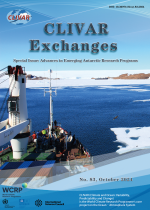CLIVAR is celebrating 20 years of progress since publication of its first SciencePlan in August 1995. To mark the occasion, past SSG co-chairs have contributed articles on an aspect of the CLIVAR project that they felt made particular strides during their tenure. Their reflections take us from the roots of CLIVAR in the late 1970s and 80s (the days of FGGE, TOGA and WOCE), ...
News
The GCOS Programme has prepared a new implementation plan in consultation with the global climate scientific and observing community which will be submitted to the UNFCCC for its COP 22 meeting which starts on 7 November 2016, in Marrakech, Morocco.
They are inviting the broader community to review the draft document, with...
The Scientific Organizing Committee, led by Drs Stammer, Wu, Qiao and Goddard, have developed an exciting scientific programme – see clivar2016.org for latest details; the Local Organizing Committee, chaired by Xiaopei Lin of OUC and Yafeng Yang of FIO are now feverously working on the final details to make sure the programme runs smoothly and to ensure that your stay in Qingdao as pleasant...
The latest CLIVAR Exchanges has just been published! This is a special issue the Kuroshio Current and Extension System highlights some of the latest findings on the Kuroshio System that were presented at another successful...
In order to better publicise papers produced by the WCRP community, papers that use WCRP data or that acknowledge WCRP in any way WCRP has created an email alias:wcrp_papers@wcrp-climate.org. All authors, panel and RF members are invited to send details of relevant articles to this address.
Session ID: 12738
Session Title: GC030. Earth’s energy imbalance and energy flows through the climate system
Section/Focus Group: Global Environmental Change
Conveners: Kevin Trenberth, Seiji Kato, Tristan L’Ecuyer,...
POSTERS
Space for posters is limited and we need to configure the poster viewing areas, so we ask that you register and pay the registration fee prior to July 31 in order to reserve a poster board. If you have already registered and paid your registration fee, or have been told that your registration fee will be paid directly by one of the OSC sponsors, no need to...
Tropical Atlantic climate recently experienced pronounced shifts of great socio-economic importance. The oceanic changes were largest in the eastern boundary upwelling systems. African countries bordering the Atlantic strongly depend upon their ocean - societal development, fisheries, and tourism. They were strongly affected by these climatic changes and will face important adaptation...
The spatial pattern of temperature changes over the last several decades shows a pronounced contrast between the high latitudes of the two hemispheres; the Arctic warmed more than any other region on the planet, whereas the Southern Ocean adjacent to...
Observations of the Atlantic Meridional Overturning Circulation (AMOC) have revealed a substantial weakening of the circulation since the start of the observations in 2004 (http://www.rapid.ac.uk/rapidmoc/). Global Climate Models (GCMs) project a weakening of the AMOC over the 21st century in response to increasing greenhouse...
At the invitation of the workshop organizer, Dr Changming Dong (Oceanic Modeling and Observation Laboratory, NUIST), ...
June 8 is World Oceans Day, designed to remind everyone of the major role the oceans have in everyday life and to celebrate together the beauty, wealth and promise of the ocean. This year’s theme is “Healthy oceans, healthy planet”, with special emphasis on stopping plastic pollution. At the request of the ICPO sponsor – the China State...
REGISTER NOW and secure a place at the WCRP’s CLIVAR Open Science Conference “Charting the course for climate and ocean research”. Present and future community leaders will come together 19-23 September in Qingdao, China, to shape the international research agenda for the coupled ocean- atmosphere system. Be part of it! See ...
Topics
From a societal perspective, many management decisions in agriculture and food security, water, disaster risk reduction and health fall into the sub-seasonal to seasonal time range, from two weeks and up to a season, while interest has also grown in the potential to provide multiannual predictions in an initialized decadal prediction framework.
Research...
The El Niño-Southern Oscillation (ENSO) is the dominant climate phenomenon affecting extreme weather conditions worldwide. Its response to greenhouse warming has challenged scientists for decades, despite model agreement on projected mean state changes. Recent studies have provided new insights into the elusive links between ENSO and Pacific climate mean-state changes. The...


























